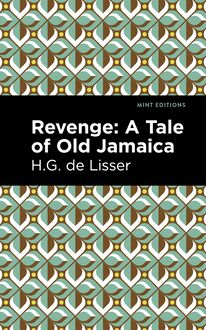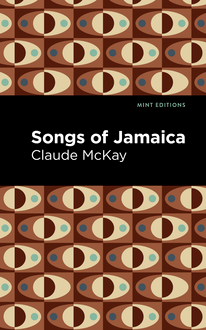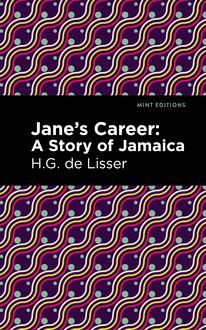-
 Univers
Univers
-
 Ebooks
Ebooks
-
 Livres audio
Livres audio
-
 Presse
Presse
-
 Podcasts
Podcasts
-
 BD
BD
-
 Documents
Documents
-
- Cours
- Révisions
- Ressources pédagogiques
- Sciences de l’éducation
- Manuels scolaires
- Langues
- Travaux de classe
- Annales de BEP
- Etudes supérieures
- Maternelle et primaire
- Fiches de lecture
- Orientation scolaire
- Méthodologie
- Corrigés de devoir
- Annales d’examens et concours
- Annales du bac
- Annales du brevet
- Rapports de stage
La lecture à portée de main
Vous pourrez modifier la taille du texte de cet ouvrage
Découvre YouScribe en t'inscrivant gratuitement
Je m'inscrisDécouvre YouScribe en t'inscrivant gratuitement
Je m'inscrisEn savoir plus
Vous pourrez modifier la taille du texte de cet ouvrage
En savoir plus

Description
Jane’s Career: A Story of Jamaica (1913) is a novel by H. G. de Lisser. Born and raised in Jamaica, H. G. de Lisser was one of the leading Caribbean writers of the early twentieth century. Concerned with issues of race, urban life, and modernization, de Lisser dedicated his career to representing the lives and concerns of poor and middle-class Jamaicans. In Jane’s Career: A Story of Jamaica, the first West Indian novel to feature a Black protagonist, de Lisser captures the hope and struggle of a young woman leaving home for the first time. “‘Jane,’ he continued impressively after a pause, ‘Kingston is a very big an’ wicked city, an’ a young girl like you, who de Lord has blessed wid a good figure an’ a face, must be careful not to keep bad company.’” Preparing to send young Jane off to the Jamaican capital, village elder Daddy Buckram attempts to offer her advice on how to keep herself safe from Satan and sinners alike. Despite his serious tone and gloomy portrait of urban life, all Jane can think of is the wonder and excitement waiting for her in Kingston. Raised in the countryside, brought up in a conservative Christian family, Jane sees her new job as a means of achieving independence and establishing her own identity as a proud black woman, of forging her own path in a new, modern Jamaica. In spite of her dreams, however, Jane finds herself subjected to the cruelties of her employer Mrs. Mason, who threatens to send a letter to her parents alleging all sorts of imagined misdeeds. Through it all, she tries to maintain a sense of pride, hopeful that hard work—and even romance—will set her free. With a beautifully designed cover and professionally typeset manuscript, this edition of H. G. de Lisser’s Jane’s Career: A Story of Jamaica is a classic of Jamaican literature reimagined for modern readers.
Sujets
Informations
| Publié par | Mint Editions |
| Date de parution | 28 mai 2021 |
| Nombre de lectures | 0 |
| EAN13 | 9781513298511 |
| Langue | English |
| Poids de l'ouvrage | 2 Mo |
Informations légales : prix de location à la page 0,0450€. Cette information est donnée uniquement à titre indicatif conformément à la législation en vigueur.
Extrait
Jane’s Career
A Story of Jamaica
H.G. de Lisser
Jane’s Career: A Story of Jamaica was first published in 1913.
This edition published by Mint Editions 2021.
ISBN 9781513297019 | E-ISBN 9781513298511
Published by Mint Editions®
minteditionbooks .com
Publishing Director: Jennifer Newens
Design & Production: Rachel Lopez Metzger
Project Manager: Micaela Clark
Typesetting: Westchester Publishing Services
Dedication
To S IR S YDNEY O LIVER
When this story was appearing in serial form in the J AMAICA G LEANER , you wrote to me saying that you were glad that I had thought of writing it. Your praise was encouraging, and I need hardly say how greatly I appreciated it. I now dedicate the tale to you, who, during the many years you were connected with Jamaica, took a deep interest in every phase of the island’s life and fortune, and have left upon it the impress of a personality at once striking, original, and truly sympathetic.
T HE A UTHOR
C ONTENTS A UTHOR ’ S N OTE I II III IV V VI VII VIII IX X XI XII XIII XIV XV XVI XVII XVIII XIX
A UTHOR ’ S N OTE
One word about the dialect in this book. It will be noticed that sometimes “you” is spelt y’u , and sometimes you ; that in the same paragraph “going” will sometimes be spelt goin ’, sometimes gwine , sometimes going ; and the reader will probably not fail to observe that the same speaker will indifferently say doan’t and don’t , the and de , that and dat , and so on.
That is how the people of the class dealt with in this story habitually speak. Many of them could, if they liked, talk with hardly a suggestion of dialect: I am alluding, of course, to the people of the city and towns. Rude dialect, hardly intelligible to the stranger and scarcely to be rendered by the written word, is still spoken in some of the country districts of the island.
I
Daddy Buckram was chief elder in the little village church on the hill, and whenever anything of importance happened or threatened to happen in the village he was always consulted in regard to it, and never failed to make some remarks which he considered appropriate to the occasion. Today he sat in the canvas easy-chair in Mr. Burrell’s hut and lectured a girl of about fifteen years of age who stood humbly before him holding her hands behind her back as she had been instructed by her mother to do, and listening to his words of advice without quite understanding what half of them meant. There were several other persons in the room. There were the girl’s parents, sturdy peasants who owned three acres of land and the tiny house they lived in, and who looked upon their property as a bank upon which they could always draw. There was their eldest son, a lad turned nineteen, who was still undecided whether he should remain at home and help his father, or emigrate to Costa Rica or Panama, there to carve out an independent career for himself. There were the three younger children, a girl of thirteen and two boys; there were also three or four neighbours who had come in to hear Daddy Buckram make one of the speeches for which he was famous. The room was crowded, and some of the people present were obliged to stand, there being in the hut but three wooden-seated chairs, the easy-chair which the Elder occupied, and a small wooden couch. But this crowding did not inconvenience Daddy Buckram, whose long and important connection with a church had developed in him an insatiable craving for large and attentive audiences.
“Jane,” he continued impressively after a pause, “Kingston is a very big an’ wicked city, an’ a young girl like you, who de Lord has blessed wid a good figure an’ a face, must be careful not to keep bad company. Satan goeth about like a roaring lion in Kingston, seeking who he may devour. He will devour you if you do not take him to the Lord in prayer. Do you’ work well. Write to you’ moder often, for a chile who don’t remember her parent cannot prosper. Don’t stay out in the street in de night, go to church whenever you’ employer allow you. If sinners entice thee, consent thou not. Now, tell me what I say to you.”
Jane hesitated a while, then answered: “You say I mus’ behave meself, sah, an’ go to church, an’ don’t keep bad company, an’ dat de devil is a roarin’ lion. An’ … an’ dat I must write mumma.”
The Elder smiled his approval. “I see,” he observed benignantly, “that you have been giving my words attention. If you always remember them like that, you will conquer in de battle.”
“Dat is so, Daddy Buckram,” remarked Jane’s mother, pleased that her daughter had won such high commendation. “I tell Jane just what you done tell her, an’ now if she go an’ do anyting foolish it will be all her own fault. We bring her up decent an’ respectable; she know dat her fader an’ me married long before she born; so dat if she go to Kingston an’ disgrace herself now, she will has to lie down on de bed she meck for herself. You hear what I say, Jane?”
“Yes, ma’am.”
“An’ what you’ moder say, is what I say,” said her father. “Keep you’self up when y’u is in Kingston, an’ don’t allow any of those Kingston buoy to fool you up. Keep straight!”
As nobody seemed to have anything else to say, Jane’s mother asked Daddy Buckram if he would have some sugar and water and some fruit; this refreshment he graciously consented to take (indeed, the old gentleman never refused refreshment of any kind); then Jane and the other young people went outside, leaving the older folk to converse with the Elder while he refreshed himself after his semi-spiritual labours.
After Jane had escaped from the observation of the Elder and her parents her demeanour changed considerably. She danced rather than walked, her strong legs and bare feet springing off the hard white limestone road as though they were made of rubber. It was now definitely decided that she should go to Kingston to work, and the excitement with which such a prospect filled her could scarcely be restrained. She ran across the road to another hut exactly like the one she had just left; there she found three other girls, two of her own age, one about five years older. They were evidently waiting to hear the news, and they instantly guessed what the decision had been from her gay manner and the bright look on her face.
“It’s all right?” asked the eldest.
“Yes; Daddy Buckram tell mumma dat I will get on in Kingston, an’ de lady say she will give me a shillin’ a week an’ look after me. So I gwine tomarrow.”
“But you lucky, though!” remarked one of the younger girls, with just a suggestion of envy in her voice. “Fancy you gwine to Kingston! I wish it was me!”
“Y’u right!” exclaimed the eldest, who, two years before, had lived in Kingston for two months, and had ever since been contemplating a return to the city, this time for good. “God! it’s there people dress an’ enjoy themself! Every evenin’ when I was dere I used to go for a long car drive, right round de belt-line. Everyting was spanking, man! When y’u go down King Street y’u see de store all full up of people buyin’ tings; and Sunday night the church are full, an’ y’u can go to Rockfort Garden for a drive, an’ see moving pictchure show. It’s a sweet life, man! If y’u go there once y’u don’t want to come back at all, at all!”
“An’ fancy Jane going now, eh?” said one of the others. “Well, perhaps my turn will come some day. We mus’ live in hope. What Daddy Buckram say to you?”
“Him say I musn’t have nothing to do wid de Kingston buoy, for dem is all a roarin’ lion.”
“Dat is all foolishness,” said the eldest decisively. “Some is good an’ some is bad; some is gentleman and some is ruffian. But y’u can’t say dem is all wort’less, for I used to have a dude in Kingston an’ him treat me high-class. It was him give me dis ear-ring I wearin’ now.”
She shook her head as she spoke, the better to display the pair of cheap gold-plated ear-rings she wore.
“Him was goin’ to sea,” she went on, “oderwise, perhaps I wouldn’t come back here at all.”
“But you is big,” said one of the others, the same that had wished she was in Jane’s place. “You is a big ’ooman, an’ can go to Kingston as y’u like. If I was like you I wouldn’t stay here. Even if I did have to run away, I would go.”
“But suppose y’u didn’t get noten to do?” asked the eldest. “Dat is what y’u have to think about. Kingston is not like de country. If y’u don’t have a job, or somebody to help y’u, you may suck salt through a wooden spoon! 1 Jane is all right, for she goin’ wid a lady who will look after her. When I went, I did go wid me aunt. But I couldn’t go by meself, for I don’t know what I would do. I have to wait fo’ my chance.”
Jane, feeling that she occupied a superior and enviable position, said good-naturedly, “I wish de whole of y’u was going wid me. But I not gwine to have anyting to do wid boys, for I promise me parents to keep meself up. I gwine to save my money, an’ come back.”
“What y’u goin’ to come back for?” asked the lady who had already had experience of city life.
This question was a poser for Jane, for she knew it was not intended by her parents that she should return. She had now reached an age when she was rapidly approaching womanhood; she had left school some two years before, and had been assisting her mother to “work” the piece of land they owned and to carry its produce every week or every fortnight to the near-by town market. But her sister was now big enough to do this, and even the younger children could help. Some sort of employment, therefore, had to be found for her, and as a Kingston lady had come to spend a week or two in the village and had expressed a desire to take back to the city with her a decent girl to do some light household work, the mother, hearing of this, had hurried to this lady and offered Jane to her as one who would suit her in every particular. The lady had put Jane’s mother through an elaborate catechism, and if the old woman had been of a reflective nature, she must have concluded that wha
-
 Univers
Univers
-
 Ebooks
Ebooks
-
 Livres audio
Livres audio
-
 Presse
Presse
-
 Podcasts
Podcasts
-
 BD
BD
-
 Documents
Documents
-
Jeunesse
-
Littérature
-
Ressources professionnelles
-
Santé et bien-être
-
Savoirs
-
Education
-
Loisirs et hobbies
-
Art, musique et cinéma
-
Actualité et débat de société
-
Jeunesse
-
Littérature
-
Ressources professionnelles
-
Santé et bien-être
-
Savoirs
-
Education
-
Loisirs et hobbies
-
Art, musique et cinéma
-
Actualité et débat de société
-
Actualités
-
Lifestyle
-
Presse jeunesse
-
Presse professionnelle
-
Pratique
-
Presse sportive
-
Presse internationale
-
Culture & Médias
-
Action et Aventures
-
Science-fiction et Fantasy
-
Société
-
Jeunesse
-
Littérature
-
Ressources professionnelles
-
Santé et bien-être
-
Savoirs
-
Education
-
Loisirs et hobbies
-
Art, musique et cinéma
-
Actualité et débat de société
- Cours
- Révisions
- Ressources pédagogiques
- Sciences de l’éducation
- Manuels scolaires
- Langues
- Travaux de classe
- Annales de BEP
- Etudes supérieures
- Maternelle et primaire
- Fiches de lecture
- Orientation scolaire
- Méthodologie
- Corrigés de devoir
- Annales d’examens et concours
- Annales du bac
- Annales du brevet
- Rapports de stage















